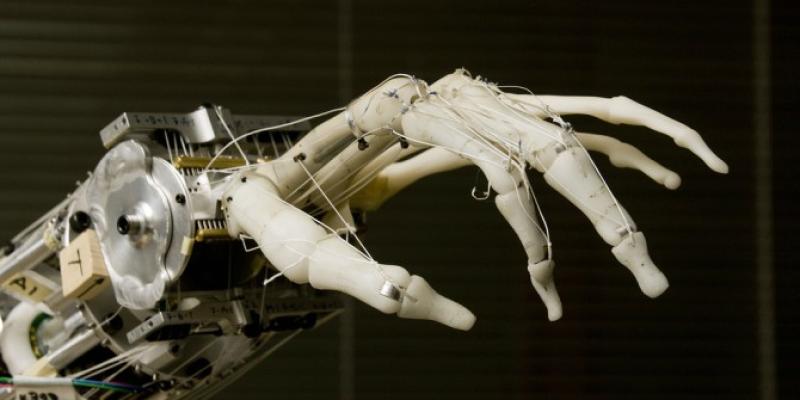
Life, Economics and the Machine


One hundred years ago our cities were very different than they are now. Many people traveled around town in horse drawn carriages. Then to travel large distances from one city to another they would take the train. Everyone was excited about the harnessing of electricity and all the new found applications for it. The industrial revolution was well on its way.
Machines were being invented at a rapid pace, and changing how we work. The electric motor and the diesel engine, could do the work of many men. People who used to be manual laborers were now running machines that dramatically increased the amount of work one person could do per day.
As a result there was this idea that eventually mechanized technology would be perfected and be capable of doing all the work that mankind used to do. Then finally mankind could focus on the more important things in life. The common idea was that the machine was going to shift us from a labor intensive society to a leisure society.
Now that the modern age has been here for some time now, we can see that, though the machine has significantly reduced the work load, our society is not any closer to being leisurely. Machines are expensive to design and build, so we have to work harder longer hours to be able to afford to purchase and maintain our machines. Machines produce a lot of pollution, and we now know that this pollution is effecting our climate. Climate change is costing us billions of dollars every year. Machines have given us the ability to change the face of the earth and the changes are not always an improvement.
Can we find a balance that will work for our planet? Can there be an environmentally conscious high tech industrial evolution? Or has the window of opportunity passed us by. Will the earth’s atmosphere deteriorate till the planet is no longer hospitable? Should we turn back to a simpler way of life to reverse the effects of climate change, or proceed further down the path of technology, in the hopes that in our future machines can increase our quality of life, and preserve our environment too?
Technological advancement is like gambling with our planets economic future. Maybe we will win or maybe we will lose. There is no way of foreseeing the long term effects of massive technological changes and preventing them.
If there were other life sustaining planets like the earth, in our solar system. Then if the weather becomes really awful on earth, we could just move to another planet. But as of yet we have not found a single planet like our own in this universe. It is amazing that we have changed our planet, possibly causing irreversible damage to it, without having a second planet to live on. This leads me to wonder, is mankind really an intelligent species? Or are we still just learning what intelligence is?

Great blog Emily. We are always interested in discovering intelligent life elsewhere in the universe, when we haven't even discovered it here on earth yet!
Unfortunately, we are still too busy clinging to the foolish superstitions of our ignorant, prehistoric ancestors and fighting amongst ourselves,(often over whose foolish superstition is the correct one!) to give a crap about the planet or even the survival of our species. You can lead a person to knowledge, but you can't make them think.
Welcome to Newstalkers, a voice of reason is always an improvement here.
Human existence is a constant pull between creation and destruction, the light and the dark , if you will. This is not a bug, it is a feature. Why this is so, we do not know, that is the purview of a higher power.
Our speculative fiction always features both utopias and dystopias. I don't think we will ever make earth a "hospitable" place to live as a species, and if a few people begin a new human existence on another planet that planet or planets will be changed by it's interaction with human beings.
You appear to be new to Newstalkers, so welcome, and I look forward to hearing what you have to say.
Don't fear the machine it has done far more good than harm. The root cause of many of our environmental problems is the population explosion. We have about ten times as many human as would be good for the health of the earths environment. The machine is extremely beneficial in reducing the need for so many humans. Our focus should be on greatly reducing the population of humans on earth not a fear of technological advancements.
Wonderful blog post Emily and welcome to NT.
I agree that it is hard to see where this planet is going. Human activity and advancements have made it hard to see where we will end up. We could turn the planet into an airless rock, or actually, invent a way to stop it. And then there is space and Mars. This latest expedition there I find one of the most exciting events since our landing on the moon. Last night I actually heard the wind on Mars and I marveled at being able to hear it, knowing that meant there is a viable atmosphere there.
As a science teacher, the things you talk about resonate with me. I have no answers for your questions, but I think your analysis is spot on.
It is amazing that we have changed our planet, possibly causing irreversible damage to it, without having a second planet to live on. This leads me to wonder, is mankind really an intelligent species? Or are we still just learning what intelligence is?
Intelligence is of course relative. We know that in spite of truly amazing scientific findings, we are just scratching the surface of the mysteries underlying our reality. That suggests the potential for an intelligence as superior to our intelligence as ours is to dogs. And, from another perspective, we can see the many mistakes we make as caretakers for our planet. Clearly we have much to learn.
Further, I do not hold that we are deliberately trashing our planet ... at least that is not the intent. We are simply being irresponsible. Worse, there are factions designed to influence the minds of those who are lead by mere suggestion into thinking that the consequences of our irresponsible behavior is just a bunch of false alarms motivated by people who want to increase the role of the State.
So, closing with intelligence, I think we have much room for improvement. Step one, IMO, is to teach our next generation how to think critically - how to discipline one's mind to not simply accept as true that which another human being claims but to do the hard work of analysis based on solid empirical evidence and logic.
Who cares if the Keystone XL pipeline will cost $8 billion dollars and it's projected profitability is only 20 years?
Who cares if it crosses over the largest fresh water aquifer in the US?
Who cares if everything ever made by humans leaks?
Everything we make is temporary
and everything eventually leaks.
It will make a few people/corporations wealthy in the short run, and that is all that seems to matter.
We are ridiculously shortsighted for a so called intelligent species..
I don't know.
I just don't know.
What is irreversible damage" to our earth?
What is intelligence?
There is no doubt we are living in uncharted territory relative to what we can decipher. CO2 and methane levels are off the off the chart.
Present to the right and only 400K sampling.
Though temperature often tends to drive CO2 and methane, we are clearly in a period of unseen CO2 and methane levels. Looking at 800K yr sampling gives similar indications.
This is new territory relative to the past 800K yrs.
Other uncharted territory has been measured by another group of scientists concerning the thermohaline aka Atlantic Conveyor which, although thought to originate the polar regions and among other things, is a water circulation thought by many to bring warm waters to the upper latitudes which, we are to understand moderates temperatures across Europe.
Anyhow, this group of scientists determined about 2 years ago a threshold was past which threatens the thermohaline. The concern is, if the thermohaline circulation stops, we could quickly plunge into the next ice age. Though there are many contradictory theories of what may happen given a collapse of the thermohaline. Too many links with varied perspectives exist to begin listing a single unified theory.
One thing is for certain, it will take a lot for the see levels to recede. NASA was kind enouh to provide use with this honest, yet maybe a little scary graph.
Since the Last Glacial Maximum the sea levels has risen close to 120M. One can't help but wonder how much of our ancestors handy work has been hidden by this sea rise. Notice too, during the Younger Dryas, which is recognized as an Ice Ages the sea levels continued to rise. Think about that. A 1,200 year Ice Age failed to reverse the rising sea level trend. The 8.200 yr cooling was hardly a bump in the road.
Let's focus in on a more recent time scale to get a better appreciation the temperatures earth and our ancestors experienced in the last 20K yrs.
Present to the right.
The Younger Dryas was pretty cold for a good while and the seas kept rising.
We snapped out of the Younger Dryas quickly too. First they told us years. Then months. now some are saying the major change happened in days. Think about that. Really, any of those scenarios. Yet, our ancestors survived...and what caused the rapid plunge and then climb out of it? A lot of theories exist.
You know, recent finding indicate early agriculture in tat warmer period prior to the ,200 Year Cooling Event. We are actually closer in temperatures to that than the warmer periods behind us. Like when Gobekli Tepe was a thriving place. If you don't know what it was, it "must be a temple" right? A place where those "hunter gatherer cavemen" where making things like this:
I don't think stupid people made this 9,600 yrs ago. To make that bracelet 9,600 yrs ago required intelligence.
So, what is intelligence? Accumulated technology? Or something else?
Are we moving away from intelligence and becoming more reliant on accumulated technology?
Or maybe, at each new discovery, maybe we are taking another step towards the realization of how little we really know?
I don't know.
...sometimes (often) when I write in the middle of the night a Captain Midnight Decoder Ring is needed to make sense of the typos. This keyboard does little to help the situation.